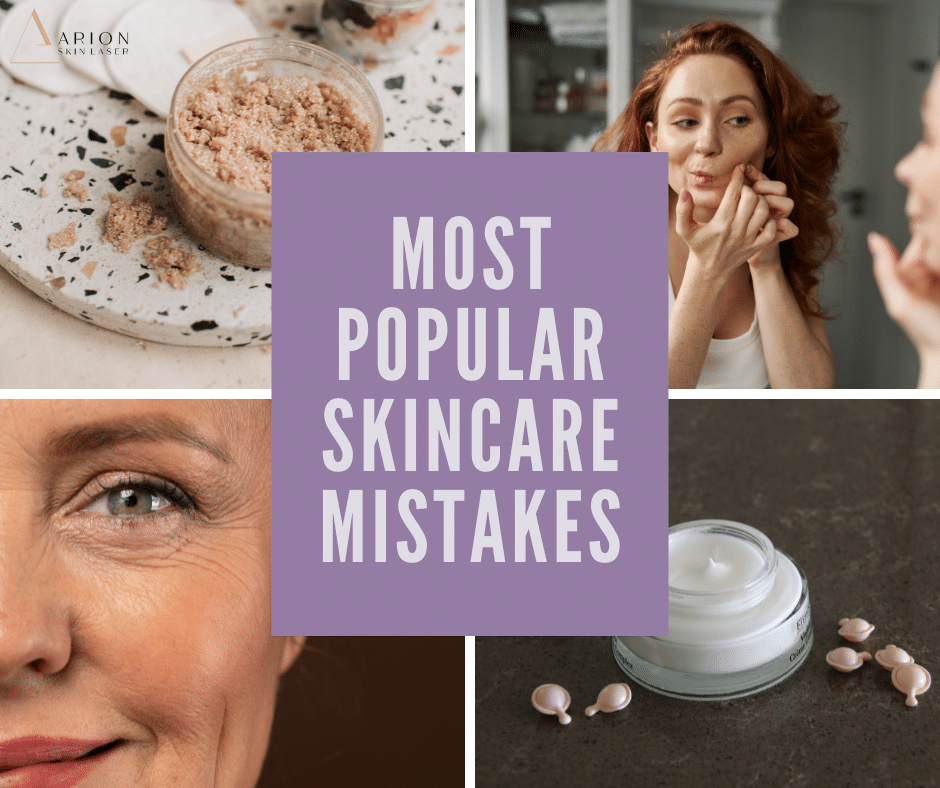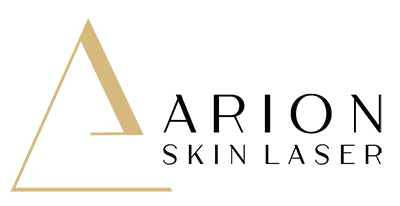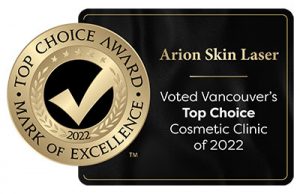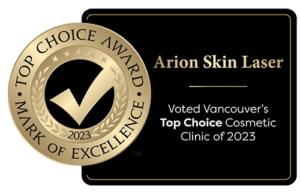Skincare is an essential part of personal well-being, yet it’s easy to get it wrong. Missteps in your skincare routine can lead to a range of issues, from minor irritations to significant skin damage. Understanding these common errors and knowing how to correct them is crucial for maintaining healthy, radiant skin. This comprehensive guide will explore the top ten skincare mistakes you might be making and provide practical advice on how to rectify them, focusing on:
- Product Misuse: Using the wrong products for your skin type or condition.
- Over-Exfoliation: Damaging the skin by removing too many layers too frequently.
- Neglecting Sun Protection: Failing to apply sunscreen, particularly when indoors.
- Poor Routine Practices: Inconsistent application of skincare products.
- Ignoring Skin Type: Not tailoring your skincare routine to match your skin’s specific needs.
- Dietary Impact: Overlooking the influence of diet on skin health.
- Dehydration: Skipping moisturizer, especially if you have oily skin.
- Stress Effects: Underestimating how stress can visibly impact skin condition.
- Price vs. Quality: Assuming that more expensive products are inherently better.
- Professional Guidance: Hesitating to consult dermatologists when issues arise.
Each section of this guide will delve into these issues in detail, providing not only the ‘what’ but also the ‘how’ to amend these common skincare blunders for better skin health and vitality.
Introduction to Common Skincare Mistakes
Skincare is a delicate balance. While you might believe that your routine is on point, there are common pitfalls that many of us fall into without realizing their impact. From the products you choose to the habits you adopt, each aspect of your skincare regimen can make or break the health of your skin. Let’s dive into the most common mistakes and how to avoid them.
Why Skincare Mistakes Impact Your Health
Skin is not just your body’s largest organ—it’s also a crucial barrier against environmental threats. When your skincare regimen is compromised, so is your skin’s ability to protect you. Understanding this connection helps emphasize the importance of proper skin care, not only for beauty but for overall health.
The Role of Skincare in Overall Wellbeing
Skincare is crucial for more than just appearance; it supports overall health. The skin is our body’s first defense against environmental hazards, including pollutants and microbes. Effective skincare routines help maintain this protective barrier, preventing infections and skin disorders. Additionally, a well-maintained skincare regimen boosts psychological well-being, enhancing self-esteem and reducing stress. There is also growing evidence linking skin health to broader systemic health, suggesting that proper skincare can mitigate issues related to inflammation and chronic diseases. Therefore, investing in a good skincare routine is essential for both physical and mental health.
Common Misconceptions in Skincare Routines
Many skincare mistakes stem from common myths. One major misconception is that more product application yields better results, which can lead to irritation and waste. Similarly, “natural” does not always mean safe, as natural ingredients can also cause allergies. Moreover, expensive products aren’t necessarily more effective; many affordable skincare options offer significant benefits. Lastly, effective skincare often requires patience, as many products need prolonged use to deliver noticeable results, especially for conditions like hyperpigmentation or wrinkles. Correcting these misconceptions can lead to more effective and safe skincare practices.
Mistake 1: Over-Exfoliating Your Skin
One of the most common skincare mistakes is over-exfoliating. Exfoliation is an integral part of a skincare routine, as it helps remove dead skin cells and promotes cell turnover. However, too much exfoliation can strip the skin of its natural oils, leading to redness, irritation, and even breakouts. This disrupts the skin’s protective barrier, making it vulnerable to infections and environmental damage. To avoid this, limit physical or chemical exfoliation to once or twice a week and opt for gentle exfoliants suited to your skin type. Observing how your skin reacts after each session can help you adjust the frequency and intensity of exfoliation to maintain a healthy, glowing complexion without compromising the skin’s integrity.
Signs of Over-Exfoliation
Over-exfoliation often manifests through telltale symptoms that can hinder the health of your complexion. If you notice increased sensitivity, redness, a feeling of tightness, or visible peeling, these are strong indicators that you may be exfoliating too aggressively. Breakouts can also become more frequent as the skin’s protective barrier is compromised, making it more susceptible to bacteria and irritation.
Managing Irritation from Over-Exfoliation
If you experience irritation from over-exfoliation, it’s essential to give your skin time to recover. Pause any exfoliation and focus on hydrating and soothing products, like aloe vera or ceramide-based moisturizers, which can help restore the skin’s natural barrier. Use gentle, fragrance-free products to avoid further irritation and help your skin heal effectively.
Recommended Exfoliation Products and Techniques
For a balanced exfoliation routine, choose products that match your skin type and sensitivity level. Chemical exfoliants like lactic acid are generally gentler than physical scrubs. Enzymatic exfoliators, which selectively remove dead skin cells without affecting living tissue, can also be a good option for sensitive skin. Whichever method you choose, ensure to apply the product with a light hand and follow the recommended frequency to keep your skin healthy and radiant.
Mistake 2: Ignoring Sunscreen Indoors
A critical skincare mistake many make is neglecting to wear sunscreen while indoors. UV rays, particularly UVA, can penetrate windows and affect your skin, contributing to premature aging and increasing the risk of skin cancer. This exposure is often overlooked, particularly for those who work near windows or spend significant time inside vehicles. To protect your skin effectively, incorporate a broad-spectrum sunscreen with at least SPF 30 into your daily skincare routine, regardless of whether you plan to be indoors or out. Opt for lightweight, non-comedogenic formulas that won’t clog pores or feel heavy on the skin, ensuring that your skin is protected from UV rays all day long. Regular use of sunscreen can significantly mitigate the harmful effects of UVA and UVB exposure, maintaining skin health and appearance.
UV Exposure Indoors: What You Need to Know
Many people underestimate the amount of UV radiation reaching them indoors. UVA rays, which penetrate deeper into the skin, can easily pass through windows in homes, offices, and cars, contributing to skin aging and the risk of skin cancer. Even indirect exposure on a cloudy day or through glass can result in sun damage over time, making it crucial to apply sunscreen as part of your daily skincare routine.
Choosing the Right Sunscreen for Daily Use
Selecting an appropriate sunscreen for daily use is vital. Look for broad-spectrum sunscreens that provide protection against both UVA and UVB rays and have an SPF of 30 or higher. Prefer formulations that are suitable for your skin type—whether oil-free for oily skin, hydrating for dry skin, or sensitive-skin formulas that are fragrance-free and hypoallergenic.
The Science Behind UV Rays and Skin Damage
Understanding the impact of UV rays on skin health is crucial for protecting against long-term damage. Ultraviolet radiation, specifically UVA and UVB rays, affects the skin differently but both contribute significantly to dermatological health issues. UVB rays are primarily responsible for sunburns; their energy damages the skin’s outer layers, causing the redness and pain associated with sunburn. This type of radiation is stronger during summer and can be effectively blocked by applying sunscreen with a high SPF rating.
On the other hand, UVA rays penetrate deeper into the skin, reaching the underlying connective tissues and cells. They are a leading cause of photoaging, which includes wrinkles, sunspots, and leathery skin. Unlike UVB, UVA rays are consistent throughout the year and can penetrate clouds and glass, making protection against them necessary even indoors or on cloudy days. These rays can also generate free radicals, which damage DNA and cell membranes, and contribute to skin cancer. Incorporating broad-spectrum sunscreen into your daily skincare routine helps mitigate these risks by providing a shield against both types of harmful UV rays, thus preserving skin health and appearance over time.
Mistake 3: Using The Wrong Skincare Products for Your Skin Type
A common skincare mistake is using products that aren’t suited to your specific skin type, which can lead to increased irritation, breakouts, and dryness. For example, someone with oily skin using heavy, oil-based creams might find their skin becomes even oilier or more prone to acne. Conversely, someone with dry skin using products formulated for oily skin might experience tightness and flaking. Understanding your skin type and its needs is essential for selecting the right products that will enhance your skin’s health rather than causing imbalances or damage.
How to Identify Your Skin Type
Identifying your skin type is the first step in creating an effective skincare routine. After cleansing your face, observe your skin’s reaction over the next hour. Oily skin typically remains shiny and may feel greasy, while dry skin might feel tight and show flaky patches. Combination skin usually exhibits oiliness in the T-zone (forehead, nose, and chin) with dryness on the cheeks. Sensitive skin often reacts with redness or itching to new products or irritants. Understanding these characteristics will guide you in choosing the correct products.
Skincare Products for Different Skin Types
Choosing the right skincare products is crucial for maintaining healthy skin. For oily skin, look for lightweight, non-comedogenic formulas that control oil and prevent breakouts. Dry skin benefits from richer, hydrating products that contain ingredients like hyaluronic acid and ceramides to lock in moisture. Combination skin may require using different products on different areas to balance the skin’s needs. For sensitive skin, hypoallergenic and fragrance-free products are best to minimize irritation. Always select products based on your specific skin type for optimal results.
Tailoring Your Skincare Routine to Your Skin’s Needs
Tailoring your skincare routine involves more than just choosing the right type of products; it also means adjusting how you use them based on your skin’s daily and seasonal changes. During winter, for example, you might need to switch to a more hydrating moisturizer, even if your skin is typically oily, to combat dry indoor heat. Conversely, in humid climates or during the summer, lighter formulas can be more appropriate. Regularly assess your skin’s condition and adjust your products accordingly to maintain its health and balance.
Mistake 4: Neglecting Nighttime Skincare
Nighttime is crucial for skin repair, making a specific evening routine essential for optimal skin health. Implementing a routine that includes cleansing, moisturizing, and targeted treatments like retinoids or peptides can significantly enhance your skin’s regeneration. Ensure that your nighttime products are free from irritants and focus on nourishment and repair to support skin cell renewal and collagen production effectively.
Importance of Nighttime Skincare Routines
Nighttime is an optimal time for skin rejuvenation, as it is when the skin naturally repairs itself from the day’s stress and damage. A dedicated evening skincare routine is vital to support these natural processes, helping to maximize repair and minimize the effects of aging and environmental exposure. Implementing a consistent routine before bed using targeted skincare products can enhance your skin’s ability to regenerate, leading to a healthier, more youthful appearance.
Essential Nighttime Skincare Steps
A comprehensive nighttime skincare routine should begin with thorough cleansing to remove impurities and makeup from the day. Follow cleansing with the application of targeted treatments such as retinoids, which promote cell turnover and collagen production. Applying a hydrating moisturizer is crucial to lock in moisture and nutrients, helping to repair the skin barrier overnight. These steps are fundamental to achieving a healthier skin complexion and maximizing the benefits of nighttime skin regeneration.
Best Practices for Overnight Skin Rejuvenation
To optimize skin rejuvenation overnight, select products that specifically cater to your skin’s needs and concerns. Use nourishing ingredients like peptides and antioxidants that combat free radical damage and promote skin recovery. Ensure your sleep environment supports skin health; consider using a humidifier to maintain air moisture, which helps prevent skin dryness. Additionally, silk pillowcases can reduce skin irritation and compression, which often lead to wrinkles and creases. These best practices can significantly improve your skin’s appearance and health by enhancing its natural overnight healing processes.
Mistake 5: Skipping Moisturizer, Especially for Oily Skin
Moisturizing is essential, even for oily skin, as it helps regulate oil production and maintain hydration levels.
Myths About Moisturizing Oily Skin
A common skincare mistake is believing that moisturizing oily skin will make it greasier or lead to breakouts. This misconception can lead people with oily skin to skip this crucial step, exacerbating their skin issues. Contrary to this myth, moisturizing helps regulate the skin’s oil production by providing it with necessary hydration, signaling the sebaceous glands to produce less oil. Skipping moisturizer can actually trigger an increase in oil production as the skin strives to compensate for dryness, leading to more pronounced oiliness and potential acne flare-ups.
Benefits of Hydrating Oily Skin
Hydrating oily skin is essential for maintaining its health and preventing overproduction of sebum. Proper moisturization helps to balance the skin’s natural oils, reducing the likelihood of acne and giving the skin a smoother, more matte appearance. Regular hydration also strengthens the skin’s barrier function, enhancing its ability to defend against environmental stressors and pollutants, which are common triggers for breakouts and irritation in oily skin types.
Recommended Moisturizers for Oily Skin
For oily skin, choosing the right moisturizer is crucial. Look for lightweight, non-comedogenic formulas that won’t clog pores or add excess oil. Ingredients like hyaluronic acid provide necessary hydration without heavy oils or emollients. Gel-based moisturizers are particularly effective, as they absorb quickly and leave a matte finish. Avoid products containing petrolatum or mineral oil, which can be too occlusive for oily skin. Opt instead for products that include salicylic acid or niacinamide, which can help regulate oil production and improve skin texture.
Mistake 6: Inconsistent Skincare Routine
Consistency is key in skincare. An irregular routine can prevent your skin from reaping the full benefits of the products you use.
Building a Consistent Skincare Regimen
Creating and maintaining a consistent skincare routine is essential to achieve and sustain optimal skin health. Consistency allows the products to work effectively and deliver results over time. When developing a skincare regimen, it’s important to select products that suit your skin type and address specific concerns. Start with the basics: a gentle cleanser, a suitable moisturizer, and sunscreen for daily protection. Gradually introduce other products like serums or toners as needed, allowing your skin to adjust and react to each new addition without overwhelming it.
Tips for Sticking to Your Skincare Routine
To maintain consistency in your skincare routine, make it as simple and realistic as possible. Align your skincare steps with your daily schedule. For instance, if you’re often rushed in the morning, prepare a quick and easy routine, and save more intensive treatments for the evening. Keeping your skincare products in a visible place can also remind you to use them regularly. Setting reminders on your phone or marking sessions on your calendar can further reinforce the habit.
How Routine Affects Skin Health
A consistent skincare routine greatly enhances your skin’s health, appearance, and its ability to combat environmental stresses. Regular use of skincare products helps to maintain the stability of the skin’s microbiome, its natural defenses, and moisture levels. This consistency prevents the common fluctuations in skin condition that can lead to issues like breakouts, dryness, and sensitivity. Over time, a steady regimen promotes a healthier, more resilient complexion, reducing the occurrence of acute skin problems and delaying signs of aging.
Mistake 7: Overlooking the Importance of Diet in Skincare
One significant skincare mistake is underestimating the role of diet in maintaining healthy skin. What you consume can directly influence your skin’s health, as nutrients from food support cellular repair and growth. Diets rich in antioxidants, vitamins, and minerals can defend against environmental damage and promote a vibrant complexion. Conversely, consuming excessive sugars and unhealthy fats can trigger inflammation and exacerbate skin issues like acne and eczema. To support your skincare routine externally with products, ensure your internal nutrition aligns with your skin health goals. Incorporating a balanced diet with plenty of water, fruits, vegetables, and healthy fats is crucial for sustaining skin that not only looks healthy but truly is.
Foods to Enhance Skin Health
Integrating specific foods into your diet can significantly enhance your skin’s health. Foods rich in antioxidants, such as berries, nuts, and green leafy vegetables, help combat free radicals and reduce oxidative stress, which can prematurely age the skin. Omega-3 fatty acids found in fatty fish like salmon and flaxseeds are essential for maintaining the skin’s elasticity and reducing inflammation. Vitamin C-rich foods like oranges, strawberries, and kiwis promote collagen production, vital for skin strength and healing. Incorporating these nutrient-dense foods into your daily diet supports your skincare routine by nourishing the skin from the inside, reinforcing its ability to protect and regenerate itself effectively.
Diet Tips for Acne-Prone Skin
For those with acne-prone skin, diet can play a pivotal role in managing outbreaks. Avoiding high-glycemic foods that spike blood sugar levels is crucial as they can trigger hormone fluctuations and inflammation, exacerbating acne. Instead, focus on low-glycemic alternatives like whole grains, legumes, and fresh vegetables. Probiotic-rich foods such as yogurt, kefir, and sauerkraut can also promote a healthy gut, which is linked to clearer skin. Zinc and vitamin A, found in pumpkin seeds and sweet potatoes respectively, help regulate sebum production and can reduce the likelihood of acne flare-ups. Implementing these dietary adjustments can complement your skincare products and routines by addressing acne from an internal perspective.
The Impact of Sugars and Fats on Your Skin
Consuming high amounts of sugars and unhealthy fats can have detrimental effects on your skin. Sugars cause glycation, a process where sugar molecules attach to proteins like collagen, weakening them and leading to wrinkles and sagging skin. High sugar intake can also exacerbate conditions like acne and rosacea due to its pro-inflammatory effects. On the other hand, unhealthy fats, particularly trans fats found in many processed foods, can contribute to increased skin oiliness and blockages in pores. To support your skin’s health through your diet, it’s advisable to minimize these foods and opt for healthier fats found in avocados, nuts, and seeds, which support moisture retention and overall skin health.
Mistake 8: Relying Solely on Expensive Skincare Brands
One of the common skincare mistakes is believing that expensive skincare brands automatically offer superior products. This misconception can lead consumers to overlook more affordable options that may be equally effective. It’s important to understand that price often reflects factors like branding, marketing, and packaging rather than the quality or effectiveness of the ingredients. Effective skincare is about the right ingredients that suit your skin type and concerns, not the price tag. By researching and understanding product formulations, you can make informed decisions that maximize your skincare routine’s effectiveness without overspending.
Evaluating Skincare Products Beyond Price
When selecting skincare products, it’s crucial to look beyond price and evaluate the formulation and efficacy. Researching active ingredients and understanding their benefits for your skin type is key. Ingredients such as retinol, hyaluronic acid, and niacinamide are backed by scientific studies showing their effectiveness in skincare. Reading product reviews, seeking recommendations from dermatologists, and checking for clinical trials can also provide insights into how well a product works. Additionally, consider the product’s sensitivity to your skin and its ability to address specific skin concerns rather than being swayed by luxury branding or celebrity endorsements.
How to Choose Effective, Affordable Skincare
Choosing effective, affordable skincare involves identifying products with high-quality ingredients that can deliver results without a hefty price tag. Generic or store brands often offer formulations similar to higher-priced brands. Look for minimalistic products that focus on essential ingredients without unnecessary additives. It’s beneficial to sample products when possible, and start with small sizes to test effectiveness on your skin. Prioritize products with transparent ingredient lists and strong consumer feedback, focusing on performance rather than packaging.
Myths About Skincare Product Pricing
A common myth in skincare is that higher prices equate to higher quality. This is not always the case, as many expensive products carry hefty markups due to branding, advertising, and packaging costs rather than ingredient quality. It’s important to debunk this myth by understanding that many affordable skincare lines offer the same active ingredients as their luxury counterparts. Price does not necessarily determine efficacy; rather, the formulation and appropriateness of the ingredients for your skin type and concerns do. Consumers should focus on ingredient labels and proven results rather than being influenced by price alone.
Mistake 9: Underestimating Stress’s Impact on Skin
Chronic stress can wreak havoc on your skin, causing breakouts, dullness, and even premature aging. When stressed, your body produces cortisol, a hormone that can increase oil production and inflammation. To combat stress’s effects, prioritize relaxation techniques like meditation or yoga. In your skincare routine, consider calming ingredients like calendula or chamomile.
Stress and Its Direct Effects on Skin Health
Stress isn’t just a mental burden; it shows up on your skin too. When you’re stressed, your body releases cortisol, which disrupts various skin functions. This can lead to an overproduction of oil, a breeding ground for acne breakouts. Additionally, stress weakens the skin’s natural barrier, making it more susceptible to dryness, irritation, and infection. You might also notice a dullness or lack of radiance in your complexion. While a good skincare routine can help, managing stress is key to achieving healthy, glowing skin.
Stress Management Techniques for Better Skin
Chronic stress takes a toll on your skin, but the good news is you can fight back. Here are some stress management techniques that can benefit both your mind and your skin:
- Prioritize sleep: Aim for 7-8 hours of quality sleep each night. When well-rested, your body has a better chance of repairing and rejuvenating your skin.
- Exercise regularly: Physical activity is a fantastic stress reliever. Even moderate exercise like brisk walking can elevate your mood and improve blood circulation, promoting healthy skin.
- Relaxation techniques: Practices like meditation, yoga, or deep breathing can help calm your mind and body, reducing the negative effects of stress on your skin.
By incorporating these techniques into your daily routine, you can not only manage stress but also see a noticeable improvement in your skin’s health.
Skin Conditions Aggravated by Stress
Stress can be a trigger for certain pre-existing skin conditions. If you suffer from eczema or psoriasis, you might experience flare-ups during stressful periods. Stress can also worsen acne breakouts and make your skin more sensitive to skincare products.
If you have a chronic skin condition, it’s important to communicate with your dermatologist about how stress might be impacting your flare-ups. They can offer personalized advice on managing both your skin condition and stress levels. Remember, a holistic approach that addresses both the mind and body is crucial for achieving and maintaining healthy skin.
Mistake 10: Not Consulting Dermatologists When Needed
Skincare can be a confusing world with countless products and conflicting advice. While building a good skincare routine is important, it can’t replace the expertise of a dermatologist. These are medical professionals trained in diagnosing and treating skin, hair, and nail conditions.
If you’re struggling with persistent skin concerns like acne, eczema, or persistent rashes, a dermatologist can provide an accurate diagnosis and recommend the most effective treatment plan. Consulting a dermatologist can save you time, money, and frustration in the long run by helping you achieve healthy skin.
When to See a Dermatologist
While you can build a solid skincare routine at home, there are times when seeking professional help from a dermatologist is crucial. Here are some signs it’s time to schedule an appointment:
- Persistent skin concerns: If you’ve been battling acne, eczema, rosacea, or another skin condition for weeks with no improvement despite over-the-counter treatments, a dermatologist can diagnose the issue and develop a targeted treatment plan.
- Sudden or changing moles: Any new mole or existing mole that changes in size, shape, color, or starts to bleed warrants a visit to a dermatologist. Early detection of skin cancer is critical, and a dermatologist can perform a biopsy to determine if there’s a cause for concern.
- Unexplained rashes or lesions: Rashes that don’t go away after a few days or are accompanied by fever, pain, or other symptoms need professional evaluation. A dermatologist can determine the cause and prescribe the appropriate treatment.
If you have any doubts or concerns about your skin, it’s always better to err on the side of caution and consult a dermatologist.
Common Skin Issues That Require Professional Help
Several skin issues benefit significantly from a dermatologist’s expertise. Here are some common examples:
- Acne: While mild acne can often be managed with over-the-counter products, a dermatologist can offer more potent prescription medications, laser treatments, and other effective strategies for moderate to severe acne.
- Eczema and psoriasis: These chronic inflammatory skin conditions require personalized treatment plans that may include prescription medications, phototherapy, or specific skincare routines developed by a dermatologist.
- Rosacea: This condition causes redness, bumps, and visible blood vessels on the face. A dermatologist can diagnose rosacea and recommend treatments to control flare-ups and improve the appearance of your skin.
Early diagnosis and proper treatment from a dermatologist can significantly improve your quality of life when dealing with these and other skin conditions.
Benefits of Regular Dermatological Check-Ups
Even if you don’t have any immediate skin concerns, scheduling regular check-ups with a dermatologist is highly beneficial. These check-ups allow for early detection of skin cancer, the most common form of cancer in the US. Early detection is crucial for successful treatment and can significantly improve the prognosis.
Dermatologists can also assess your skin type and recommend customized skincare routines and products to address any underlying issues and promote overall skin health. They can also provide valuable advice on sun protection and preventing premature aging. By incorporating regular dermatological check-ups into your healthcare routine, you’re investing in the long-term health and appearance of your skin.
Conclusion: How to Correct These Skincare Mistakes
Correcting these common skincare mistakes involves a holistic approach that includes using the right products, adopting healthy habits, and seeking professional advice when necessary. By implementing the recommended changes, you can enhance your skin’s health, appearance, and resilience against environmental challenges. Remember, it’s never too late to revamp your skincare routine and see significant improvements.
For more specialized advice and treatment options, consider visiting a reputable Skin Laser Clinic Vancouver. They offer professional insights and advanced treatments that can cater to your specific skincare needs, ensuring you receive the best possible care for your skin. From acne scar reduction to wrinkle softening, Arion Skin Laser’s team of experts can help you achieve your desired results and unlock your skin’s full potential.








